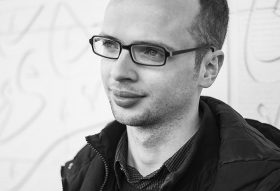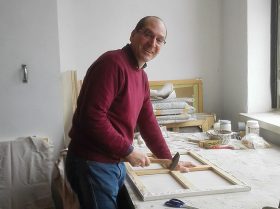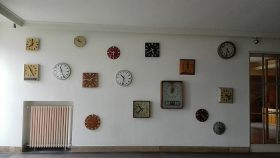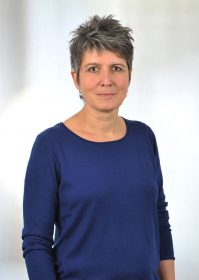
Ármin Langer; Foto: Kat Kaufmann
As part of the series “New German Stories,” we will present the book Ein Jude in Neukölln. Mein Weg zum Miteinander der Religionen (A Jew in Neukölln. My path to the coexistence of religions) by Ármin Langer on 19 October 2016. The author, who will be our guest on this evening, will talk about his life as a Jewish activist and his experiences as coordinator of the Berlin Salaam-Shalom initiative that sets an example of peaceful Jewish-Muslim coexistence.
We asked Ármin Langer three questions:
Alina Gromova: Ármin, you decided at the age of 21 years to become a rabbi even though you are from a secular family. What led you to this decision back then?
Ármin Langer: Already as a child I was open to religion, but this feeling found no frame until I was 20. → continue reading
An Interview with Ines Pohl
The European Union currently faces a tensile test: Great Britain’s vote to exit, the rise of rightwing populist movements, the lack of a solution to the flow of refugees, fear of terror attacks, and economic decline. Reference is often made, in the political debate about how to respond to these issues going forward, to history.
At our event, “Times of Crisis” on 7 September 2016, we would hence like to discuss the significance of the past for current European politics, particularly considering today’s problems, together with international guests from Great Britain, France, and Poland, as well as Germany. The panel will consist of Dan Diner, Dietmar Herz, Étienne François, Hans Kundnani, and Adam Michnik. The moderator will be Ines Pohl, of whom we asked four questions that extend our view to include the USA.
Nevin Ekinci: Ms. Pohl, you have been in Washington since the end of 2015 as the correspondent for Deutsche Welle. How do you perceive the debates about the current European “crisis,” from a distance? Would you even use the term “times of crisis?” → continue reading
Joachim Seinfeld’s HeimatReisen (HomelandTravels)

Joachim Seinfeld at work in his atelier in the former broadcasting station in Berlin; Jewish Museum Berlin, photo: Michaela Roßberg
The wonderful thing about Berlin for me as an historian is that there’s something around every corner waiting to wow me or get my “history heart” to skip a beat. I was able to get to know yet another spot this year when I interviewed Joachim Seinfeld in his atelier in the old broadcasting station in the Berlin Treptow-Köpenick district. We talked about his HeimatReisen (HomelandTravels) project for the art vending machine at the Jewish Museum Berlin (further information on the art vending machine on our website).

The station’s entryway was built with marble tiles from the New Reich Chancellery; Jewish Museum Berlin, photo: Michaela Roßberg
The broadcasting station on Nalepastrasse is a unique place: Beginning in 1956, programming across the former GDR was produced and broadcast from there. The public broadcasting system, established following German reunification, took over this work in 1991 and then, after several changes in ownership, the building became a place for artists from around the world to establish their ateliers.
Joachim, your photo series – available to visitors in the art vending machine – consists of a number of images depicting you in various locations around Germany. Why, of all your work, these images for the vending machine?
In 2006, I did a photo series about Poland. In 2011, I thought to do something similar about Germany. So I wanted to do it anyway, and I chose the images most interesting to me. → continue reading



